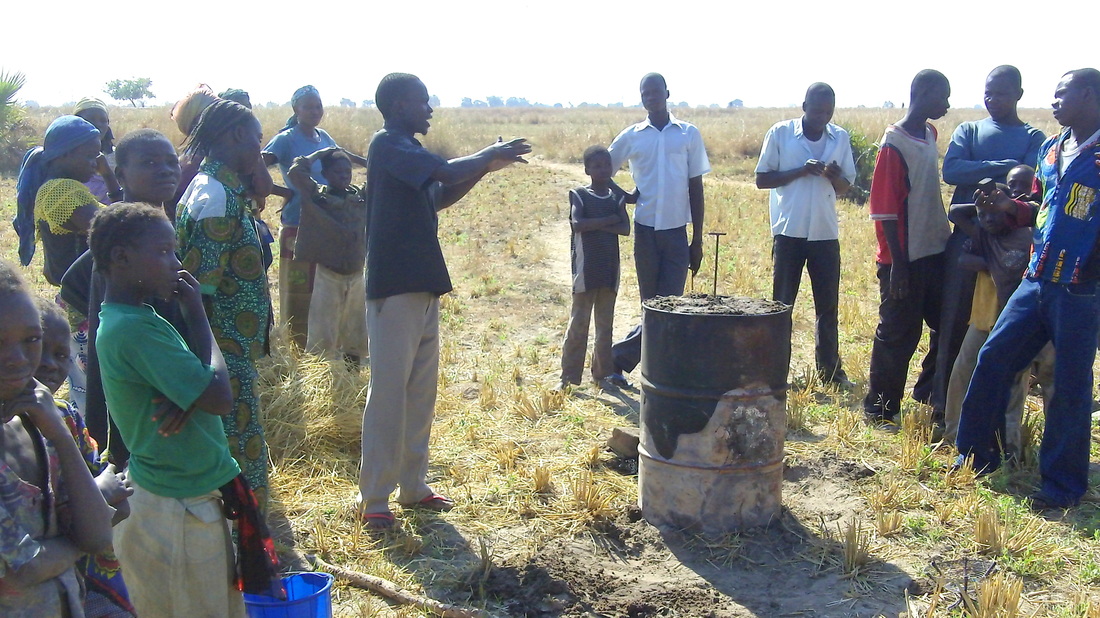Green Coal and Biochar Production
ENVODEV's mission is to develop professional opportunities that respond to the need for better cooking methods and more efficient cooking energy: harness the resources of local communities and develop new skills while alleviating the serious energy crisis in Chad.


Overview of the project

Chad has a strong agricultural potential; large fields of cotton, rice, and sesame are cultivated, but the country was at risk of losing large areas of forest cover. One of the reasons for this is the high dependence on wood and charcoal for daily activities, such as cooking and farming.
The Chadian government banned the production, distribution and use of charcoal in December 2008. This measure was imposed to combat deforestation and global warming, but without providing alternatives. The population turned to firewood or continued to use charcoal illegally. More than 97% of the population has no access to electricity on a regular basis, and alternatives are limited and often unaffordable, and more than 90% of farmers are unfamiliar with natural fertilizers.
Charcoal has been difficult to find since it was banned by the government. Raw wood burns less efficiently, requiring more wood to meet the needs. The fumes produced by burning wood and charcoal contain irritating pollutants, which lead to respiratory infections. Children and women are particularly affected because they spend a lot of time near cooking fires. They travel long distances to collect wood, exposing themselves to abduction and rape. The government has set up a reforestation programme, but without establishing a production line for good quality seedlings.
ENVODEV proposes solutions to replace charcoal with locally produced fuel: green charcoal and biochar. Its production requires a lot of readily available resources, which are mostly usually destroyed. The green charcoal is offered at an affordable price, which helps to alleviate the energy crisis in Chad.
In addition, ENVODEV aims at providing farmers and market gardeners with a new, locally produced soil improver that requires little knowledge for its use, which can alleviate the problem of soil pollution caused by expensive chemicals. The interest shown in public demonstrations suggests that there is local, national and international interest in these products, from the general public, organisations, public and private representatives and authorities.
The aim is to identify the materials that go into the production of green charcoal and to target areas where there is an abundance of these materials. The selected samples are evaluated and tested, and ENVODEV decides on the techniques for producing green charcoal. A training workshop is then set-up, and ENVODEV establishes a production team. Training in green charcoal production techniques focuses on the collection of raw materials, the use of production tools, carbonisation and the production of green charcoal. Groups, once formed, are entrusted with production and distribution.
ENVODEV is responsible for the management, and coordination of activities (training sessions, distribution, marketing, administration). In regards to the production of green charcoal, which is a biofuel produced from biomass (agricultural waste, biodegradable industrial waste, etc.), ENVODEV has been able to train and equip four (4) women’s groups of forty-eight (48), eight (8) groups and mixed associations of eighty (80) young people in the towns of Moundou and its surroundings, Doba, Kelo and N’djaména. For the production and use of biochar, which is a soil amendment that helps retain water for plant growth, ENVODEV has been experimenting with this new product in the town of Moundou for the past two years with farmers and market gardeners in order to improve the yield of their crops. Twelve farmers and market gardeners have benefited from training and experimentation on the production and use of biochar.
The purpose of this project is to train and equip young people and women in the city of Moundou for the production of green charcoal and the experimentation of biochar. The first phase of the project aims at training on the production of green charcoal and its dissemination to households and restaurants in order to limit the use of charcoal. The second phase consists of continuing the experimentation of biochar with farmers and market gardeners in order to master its use in crops; this will allow the latter to improve the yield of their crops, and limit the use of fertilisers and chemicals that are harmful to the environment.
Ongoing research
01/01/2021 - 06/30/2021
In the implementation of the green coal and biochar production project:
- Four (4) women’s groups of forty-eight (48) benefited from training and received equipment
- Eight (8) groups and mixed associations of eighty (80) young people in the towns of Moundou and its surroundings, Doba, Kelo and N’djaména – have also benefited from training and received equipment
- Five (5) tons of green charcoal produced
- Two (2) tons of biochar produced
- Ten thousand (10,000) people made aware about the benefits of using green charcoal and biochar
- More than three thousand (3,000) people have access to green charcoal and biochar and use it routinely
- Twelve farmers and market gardeners have benefited from training and experimentation on the production and use of biochar
During the training on green charcoal and biochar production, emphasis was placed on the quality of the green charcoal and biochar that will be produced: it was stated that the green charcoal produced should not crumble after drying and should not give off smoke during use. The biochar produced should not contain any ash.
- All groups have understood the training they received, and have mastered the production of charcoal and biochar
- Users appreciate the products purchased, and are increasingly requesting access to the products provided
- Local authorities encourage the continuation of the activities and their expansion to other areas
ENVODEV staff is comforted in its activities and is motivated to persevere.
This project is funded by MCC after submitting the project answering a call for proposals.
organisation
ENVODEV is a non-profit association that has been working in the field of environmental protection for over ten (10) years. Its activities focus on the training and providing the tools, skills, and equipment to groups, associations and young entrepreneurs on the production of green coal, improved stoves and biochar.
Regarding the production of green charcoal, which is a biofuel produced from biomass (agricultural waste, biodegradable industrial waste, etc.), ENVODEV has been able to train and equip four (4) women’s groups of forty-eight (48), eight (8) groups and mixed associations of eighty (80) young people in the towns of Moundou and its surroundings, Doba, Kelo and N’djaména.
For the production and use of biochar, which is a soil amendment that helps retain water for plant growth, ENVODEV has been experimenting with this new product in the town of Moundou for the past two years with farmers and market gardeners in order to improve the yield of their crops. Thus, twelve farmers and market gardeners have benefited from training and experimentation on the production and use of biochar. Activities related to the production of improved stoves are carried out in the towns of Moundou, Kelo and Ndjaména with young people and women. More than fifty young people and women have been trained for this purpose. The activities linked to the production of these stoves have enabled these young people and women to have jobs and income enabling them to meet their social and economic needs.
In parallel, ENVODEV also works in collaboration with several other organisations at the national and international level on capacity building and data exchange related to environmental protection and research & development.
MCC (Menonite Central Comite)


